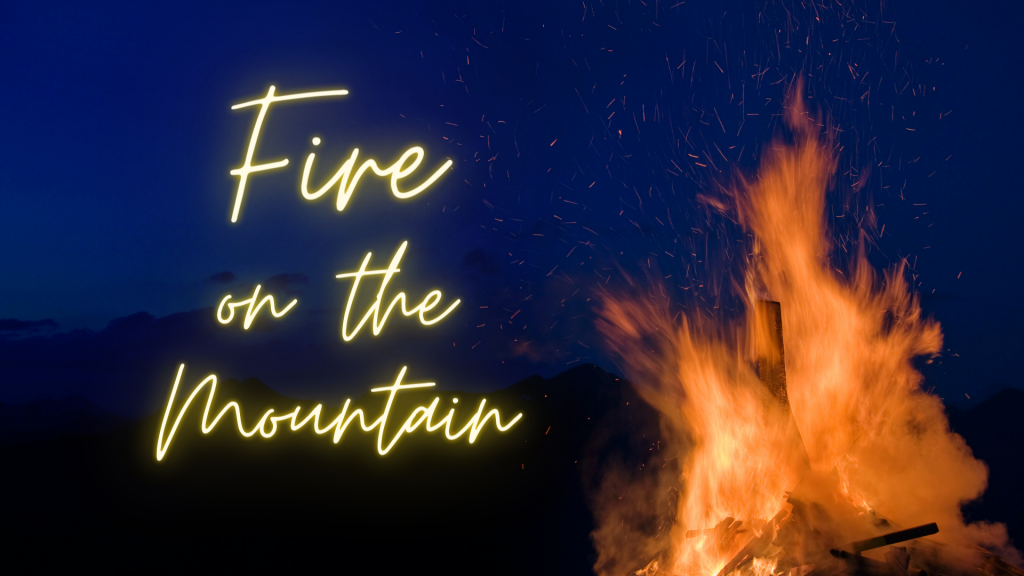Fire on the Mountain

Sometime in the last year I read Fire on the Mountain by Terry Bisson – an alternate-history novel. The one changed piece of history that sets everything on a different course is: Harriet Tubman was able to be there with the abolitionist John Brown for his 1859 raid at Harper’s Ferry. Her wisdom changes everything, and instead of being a deadly failure, the raid is successful. The band of abolitionists makes its escape into the Blue Ridge mountains with stolen weapons to use in the cause of freeing the slaves.
The novel speaks from the point-of-view of a 12-year-old boy who is enslaved near Harper’s Ferry. He and the others on the farm are trying to make sense of the raid. The gossip lines are lighting up, the word “freedom” hangs tantalizingly in the air – and yet they are terrified to speak above a whisper, because, after all, their masters still hold them in slavery, and such talk is dangerous.
The boy remembers:
There was a granny woman at Green Gables, and she said that God would send a sign of deliverance, a fire on the mountain. Sure enough, as soon as it got darker we saw it, blazing like a star that had come down and landed right on top of the ridge. All the talking stopped. All you could hear was wood and leather hinges creaking and children being hushed as everybody came out of the cabins and stood there watching, watching, watching. “Fire on the mountain,” the granny woman said. “They up there sharpening they swords.” Then she said that word again: freedom.1
From down in the valley, the people who are enslaved look up to the mountains, where they see that fire and know that the people gathered around it are fighting for them. It makes them hopeful. It makes them stronger. It makes them prepare.
Advent and Christmas are filled with words from the book of Isaiah. Quotations fill not only pulpits, but also Advent liturgy and Christmas carols and decorations and even the Bible stories about Jesus’ birth. “For a child has been born for us, a son given to us…” (Isaiah 9:6)
These prophetic words are like a fire on a mountain. At the time they were first written the people of Israel were dealing with political conflict and impending war, followed by violence, the destruction of their capital city and the Temple, and finally exile. God’s people were surrounded by hopelessness; it was during this time that people wrote the book of Lamentations and some of the most tragic psalms. Yet in those very moments of deepest darkness, God lit a fire on a mountain:
“The wolf shall live with the lamb, the leopard shall lie down with the kid, the calf and the lion and the fatling together, and a little child shall lead them…They will not hurt or destroy on all my holy mountain; for the earth will be full of the knowledge of the Lord…” (Isaiah 11:6-9).
“Say to those who are of a fearful heart, ‘Be strong, do not fear! Here is your God. He will come with vengeance, with terrible recompense. He will come and save you” (Isaiah 35:4).
“Comfort, O comfort my people, says your God…A voice cries out: ‘In the wilderness prepare the way of the Lord…’” (Isaiah 40:1, 3).
Isaiah’s words are not only for solace – not “There, there,” and a pat on the back – not “pie in the sky in the great by-and-by.” They are what the Old Testament scholar Walter Brueggemann calls transformative solidarity – “a powerful intervention that creates new possibilities.”2
The words of hope are powerful because it is God doing the speaking and God doing the intervening. God: the only one more powerful than the forces of this world that keep us down; God: the only one more powerful than our own despair.3 These words are God’s Word to us, God’s policy towards us, God’s promise for us. God has bound God’s self to us with these words.
When we hear these words, we might imagine a fire on a mountain – the presence of God, working for our good even when God seems so far away. A burning bush that will catch the attention of a future liberator (Exodus 3). The Spirit that will give disciples the power to speak to those different from them (Acts 2:1-12). The refining flame that will melt away wrongdoing (Malachi 3). A pillar of fire that lights our way when we must journey through the darkness (Exodus 13:17-22). The light that shines in the darkness, and the darkness does not overcome it (John 1:5).
I lift up my eyes to the hills –
From where will my help come?
My help comes from the Lord,
Who made heaven and earth.
He will not let your foot be moved;
He who keeps you will not slumber.
He who keeps Israel
Will neither slumber nor sleep. (Psalm 121:1-4).
+++
Pastor Kate
Nov. 30, 2022
Pastor Kate and Pastor Jim take turns writing weekly devotions for the Chapel of the Resurrection. Contact them here:
1 Terry Bisson, Fire on the Mountain, (Oakland: PM Press, 2009), p. 28.
2 Walter Brueggemann, Isaiah 40-66, (Louisville: Westminster John Knox Press, 1998), p. 16.
3 Brueggemann, p. 20-21.